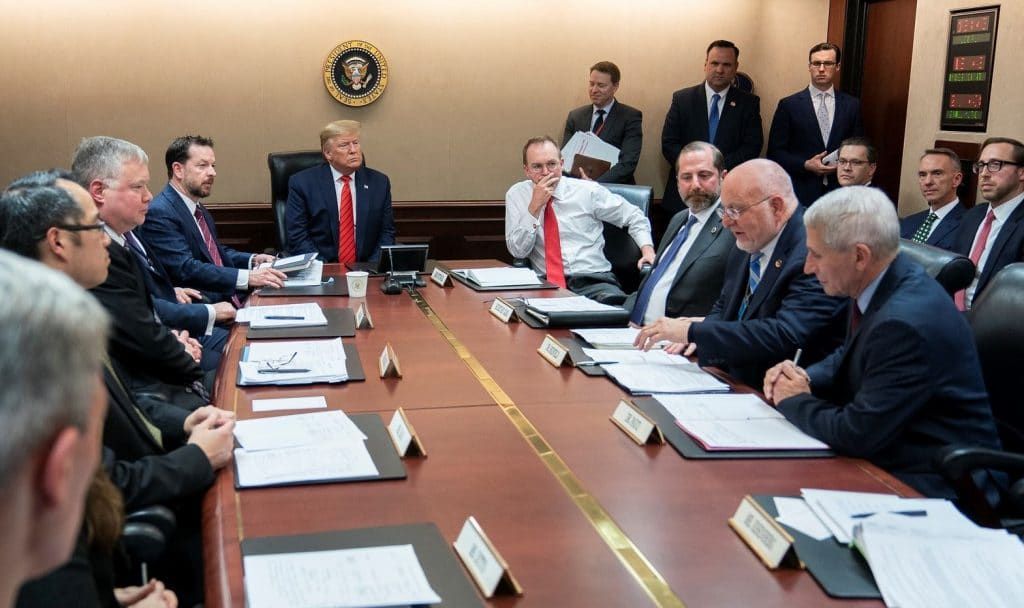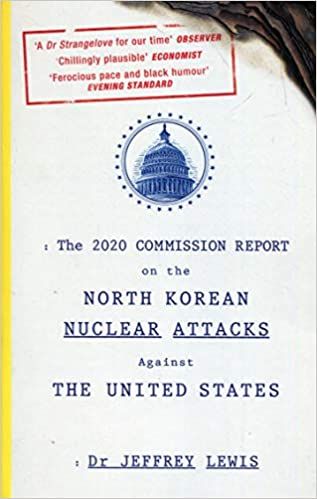How the coronavirus outbreak is like a nuclear attack: An interview with Jeffrey Lewis
By Jeffrey Lewis, John Krzyzaniak | March 20, 2020
 President Trump receives a briefing on the coronavirus outbreak in the Situation Room of the White House, Jan. 29, 2020. Photo Credit: White House.
President Trump receives a briefing on the coronavirus outbreak in the Situation Room of the White House, Jan. 29, 2020. Photo Credit: White House.
In 2018, arms control expert Jeffrey Lewis published a book titled The 2020 Commission Report on the North Korean Nuclear Attacks Against the United States: A Speculative Novel. As the title suggests, it’s a fictitious account, written in the style of a retrospective government report, of a nuclear attack on the continental United States.
It’s not about a global pandemic, nor is it meant to be predictive. But because the main events of the novel play out over several days in late March 2020, the Bulletin contacted Lewis to ask him about his thoughts on the ongoing coronavirus outbreak, and whether he sees any similarities to the nuclear crisis that unfolds in the book.
In this interview, Lewis describes the pandemic as a “nuclear war in slow motion” and says that effectively managing both types of crises requires a cooperative, internationalist approach. In both the real world and the fictional world of his book, he sees a disaster exacerbated by dysfunction within the White House—a product not only of staffing inadequacies but also of senior advisers who are more focused on managing the president than on managing the crisis itself.
The transcript has been edited for length and clarity.
John Krzyzaniak: Your book gives a fictitious, speculative account of a nuclear attack against the United States, and how the US government responds. Obviously, what’s happening right now is not a nuclear attack. But you must see parallels between the coronavirus pandemic and what happens in your book.
Jeffrey Lewis: The biggest parallel is that what is about to happen will have been largely preventable, particularly in the United States, where the bungled federal response is exactly the kind of dysfunction that I tried to depict in the book.
In The 2020 Commission, no one wants nuclear war. Trump doesn’t want a nuclear war; his staff doesn’t want a nuclear war. And yet they stumble into one. And the way in which they stumble into one is by being completely focused on managing the president’s emotions and the political situation, leaving no time to actually manage the crisis.
And every news story I’ve read, every inside account of what’s happening with the coronavirus is exactly that. The federal response is entirely about managing Trump’s ego and whims, and there’s actually precious little attention devoted to managing the outbreak.
JK: What about the tweets? In your book, the tweets contribute to the crisis.
JL: One of the things I have been criticized most frequently for is the idea that the tweets in the book are somehow unrealistic, which to me is mind-boggling, because most of them are real tweets. I just changed the names of the people they were about. I took real tweets about Chuck Schumer and Nancy Pelosi and the Affordable Care Act and changed them to be about Kim Jong Un and the deal he was trying to negotiate. But they really were Trump’s words.
So a lot of people complain that the book is a cheap shot at Trump, but in fact, I think it’s accurate to say that he’s very immersed in his own feelings all the time. He’s not making any effort to play the role of president in the sense of being concerned about how his words and actions will be interpreted by others. He is emoting because of how it makes him feel in the moment. And so the way in which his tweets and comments have tanked the stock market and generally sown panic and confusion, that’s precisely what he does in the book. It’s kind of a minor detail whether the enormous numbers of casualties are from a nuclear war or from a pandemic, it’s the same fundamental dysfunction.
JK: During a nuclear crisis, I’d think the timelines would be much more compressed compared to what we’re seeing in the coronavirus outbreak. Is that better or worse?
JL: I don’t think it makes any difference. I don’t think giving this group of human beings more time leads to better outcomes. Of course, from the perspective of a novelist the time issue in the book creates a sense of tension. But I could easily have written the book about a pandemic, though it probably wouldn’t have been as good as Michael Crichton’s The Andromeda Strain.
In the nuclear field, we do worry that decisions made under tight timelines will be worse decisions, and that’s probably true. But I don’t think any amount of time would allow Trump to make better decisions. It’s just the situation might be slightly more forgiving. But as we’re learning now, it’s not. It’s not more forgiving.
JK: The response to the virus in United States has been somewhat decentralized. State and local officials are acting on their own to mitigate things in a way that they might not be able to do during a nuclear crisis. Does that help?
JL: No, I think the lack of adequate testing capacity has forced localities to step in. But unfortunately, I don’t think states and localities have the tools that they need to really combat this effectively. I don’t want to be critical of them because they’re trying to do the best they can. But there’s a reason we have a federal government. The federal government has responsibilities and it is failing abjectly at them.
Not to dwell too much on the book, but that’s the central warning of the novel, that the government has really important responsibilities. And if you have people who are not competent in their positions, or who are not interested in doing that particular job, and if you have this kind of leader in this situation, things get out of hand much more quickly than you realize.
JK: How important is international coordination?
JL: My mentor, John Steinbruner, who was the chair of my dissertation committee, started his career working on nuclear weapons issues. But one of the other main streams of his research was on pandemics, because to him, it was the same problem. These are both cases where humankind is facing massive danger. And to prevent them requires good international governance and cooperation, because these dangers are way too big for countries to deal with on their own.
I think he was exactly right; a pandemic is just a kind of nuclear war in slow motion. Preventing nuclear war and managing a pandemic require the same conceptual approach.
JK: We will probably have many weeks and months ahead, while we’re all trapped in our homes, to dwell on the lessons learned, and whether certain lessons could be applied to nuclear command and control. But from an academic perspective, have you learned any lessons for your work in the nuclear field?
JL: One thing about nuclear command and control, which the virus outbreak underscores, is that it is so hard to get good information in a crisis. The epidemic spiraled out of control so quickly in certain countries that even the best experts were rushing to figure out what was going on. To me the danger of a nuclear war is not that somebody’s going to get up one morning and say, “Ah, fuck it,” and push the button. It’s that we’re deeply flawed as human beings, and we have imperfect information, and we’re always trying to make decisions under complexity. And I think you saw the same things here. There was enough uncertainty early on that people could argue about how contagious the virus is, or how deadly it is. That uncertainty hampered the response at a critical moment.
Together, we make the world safer.
The Bulletin elevates expert voices above the noise. But as an independent nonprofit organization, our operations depend on the support of readers like you. Help us continue to deliver quality journalism that holds leaders accountable. Your support of our work at any level is important. In return, we promise our coverage will be understandable, influential, vigilant, solution-oriented, and fair-minded. Together we can make a difference.

















Nuclear war has some similarities with coronavirus – but is worse. While the pandemic is creating mass unemployment nuclear holocaust will physically destroy infrastructure and the means to produce food and other essentials. It is a terrifying pestilence, but covid-19 should not blind us to the danger of world war. It is already been manipulated for political purposes, used to find scapegoats and demonize opponents. History should not be forgotten in all of this.
https://www.ghostsofhistory.wordpress.com/
In one place Mr. Lewis draws an analogy between the danger of a nuclear crisis and that of a pandemic. Consistent with this he compares managing a pandemic with preventing a nuclear war. This seems not implausible although he cites only the gravity of the danger to back up his claim. But preventing a nuclear war is something very different from managing a nuclear attack. So his conclusion that the pandemic is “just a kind of nuclear war” doesn’t follow. We should beware of the war metaphor in the case of a pandemic just as much as with other natural… Read more »